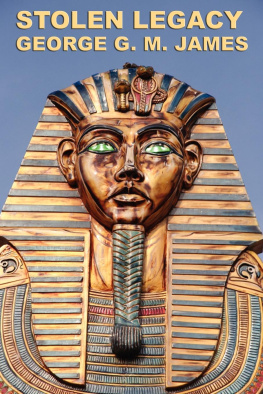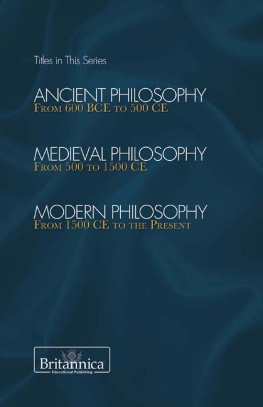STOLEN LEGACY
By GEORGE G. M. JAMES
The Aims of the Book
The aim of the book is to establish better race relations in the world, by revealing a fundamental truth concerning the contribution of the African Continent to civilization. It must be borne in mind that the first lesson in the Humanities is to make a people aware of their contribution to civilization; and the second lesson is to teach them about other civilizations. By this dissemination of the truth about the civilization of individual peoples, a better understanding among them, and a proper appraisal of each other should follow. This notion is based upon the notion of the Great Master Mind: Ye shall know the truth, and the truth shall make you free. Consequently, the book is an attempt to show that the true authors of Greek philosophy were not the Greeks; but the people of North Africa, commonly called the Egyptians; and the praise and honour falsely given to the Greeks for centuries belong to the people of North Africa, and therefore to the African Continent. Consequently this theft of the African legacy by the Greeks led to the erroneous world opinion that the African Continent has made no contribution to civilization, and that its people are naturally backward. This is the misrepresentation that has become the basis of race prejudice, which has affected all people of color.
For centuries the world has been misled about the original source of the Arts and Sciences; for centuries Socrates, Plato and Aristotle have been falsely idolized as models of intellectual greatness; and for centuries the African continent has been called the Dark Continent, because Europe coveted the honor of transmitting to the world, the Arts and Sciences.
I am happy to be able to bring this information to the attention of the world, so that on the one hand, all races and creeds might know the truth and free themselves from those prejudices which have corrupted human relations; and on the other hand, that the people of African origin might be emancipated from their serfdom of inferiority complex, and enter upon a new era of freedom, in which they would feel like free men, with full human rights and privileges.
Start Publishing LLC
Copyright 2012 by Start Publishing LLC
All rights reserved, including the right to reproduce this book or portions thereof in any form whatsoever.
First Start Publishing eBook edition October 2012
Start Publishing is a registered trademark of Start Publishing LLC
Manufactured in the United States of America
10 9 8 7 6 5 4 3 2 1
ISBN 978-1-62793-015-4
Introduction: Characteristics of Greek Philosophy
The term Greek philosophy, to begin with is a misnomer, for there is no such philosophy in existence. The ancient Egyptians had developed a very complex religious system, called the Mysteries, which was also the first system of salvation.
As such, it regarded the human body as a prison house of the soul, which could be liberated from its bodily impediments, through the disciplines of the Arts and Sciences, and advanced from the level of a mortal to that of a God. This was the notion of the summum bonum or greatest good, to which all men must aspire, and it also became the basis of all ethical concepts. The Egyptian Mystery System was also a Secret Order, and membership was gained by initiation and a pledge to secrecy. The teaching was graded and delivered orally to the Neophyte; and under these circumstances of secrecy, the Egyptians developed secret systems of writing and teaching, and forbade their Initiates from writing what they had learnt.
After nearly five thousand years of prohibition against the Greeks, they were permitted to enter Egypt for the purpose of their education. First through the Persian invasion and secondly through the invasion of Alexander the Great. From the sixth century B.C. therefore to the death of Aristotle (322 B.C.) the Greeks made the best of their chance to learn all they could about Egyptian culture; most students received instructions directly from the Egyptian Priests, but after the invasion by Alexander the Great, the Royal temples and libraries were plundered and pillaged, and Aristotles school converted the library at Alexandria into a research centre. There is no wonder then, that the production of the unusually large number of books ascribed to Aristotle has proved a physical impossibility, for any single man within a life time.
The history of Aristotles life, has done him far more harm than good, since it carefully avoids any statement relating to his visit to Egypt, either on his own account or in company with Alexander the Great, when he invaded Egypt. This silence of history at once throws doubt upon the life and achievements of Aristotle. He is said to have spent twenty years under the tutorship of Plato, who is regarded as a Philosopher, yet he graduated as the greatest of Scientists of Antiquity. Two questions might be asked (a) How could Plato teach Aristotle what he himself did not know? (b) Why should Aristotle spend twenty years under a teacher from whom he could learn nothing? This bit of history sounds incredible. Again, in order to avoid suspicion over the extraordinary number of books ascribed to Aristotle, history tells us that Alexander the Great, gave him a large sum of money to get the books. Here again the history sounds incredible, and three statements must here be made.
(a) In order to purchase books on science, they must have been in circulation so as to enable Aristotle to secure them. (b) If the books were in circulation before Aristotle purchased them, and since he is not supposed to have visited Egypt at all, then the books in question must have been circulated among Greek philosophers. (c) If circulated among Greek philosophers, then we would expect the subject matter of such books to have been known before Aristotles time, and consequently he could not be credited either with producing them or introducing new ideas of science.
Another point of considerable interest to be accounted for was the attitude of the Athenian government towards this so-called Greek philosophy, which it regarded as foreign in origin and treated it accordingly. Only a brief study of history is necessary to show that Greek philosophers were undesirable citizens, who throughout the period of their investigations were victims of relentless persecution, at the hands of the Athenian government. Anaxagoras was imprisoned and exiled; Socrates was executed; Plato was sold into slavery and Aristotle was indicted and exiled; while the earliest of them all, Pythagoras, was expelled from Croton in Italy. Can we imagine the Greeks making such an about turn, as to claim the very teachings which they had at first persecuted and openly rejected? Certainly, they knew they were usurping what they had never produced, and as we enter step by step into our study the greater do we discover evidence which leads us to the conclusion that Greek philosophers were not the authors of Greek philosophy, but the Egyptian Priests and Hierophants.
Aristotle died in 322 B.C. not many years after he had been aided by Alexander the Great to secure the largest quantity of scientific books from the Royal Libraries and Temples of Egypt. In spite however of such great intellectual treasure, the death of Aristotle marked the death of philosophy among the Greeks, who did not seem to possess the natural ability to advance these sciences. Consequently history informs us that the Greeks were forced to make a study of Ethics, which they also borrowed from the Egyptian Summum Bonum or greatest good. The two other Athenian Philosophers must be mentioned here, I mean Socrates and Plato; who also became famous in history as philosophers and great thinkers. Every school boy believes that when he hears or reads the command know thyself, he is hearing or reading words which were uttered by Socrates. But the truth is that the Egyptian temples carried inscriptions on the outside addressed to Neophytes and among them was the injunction know thyself. Socrates copied these words from the Egyptian Temples, and was not the author. All mystery temples, inside and outside of Egypt carried such inscriptions, just like the weekly bulletins of our modern Churches.















